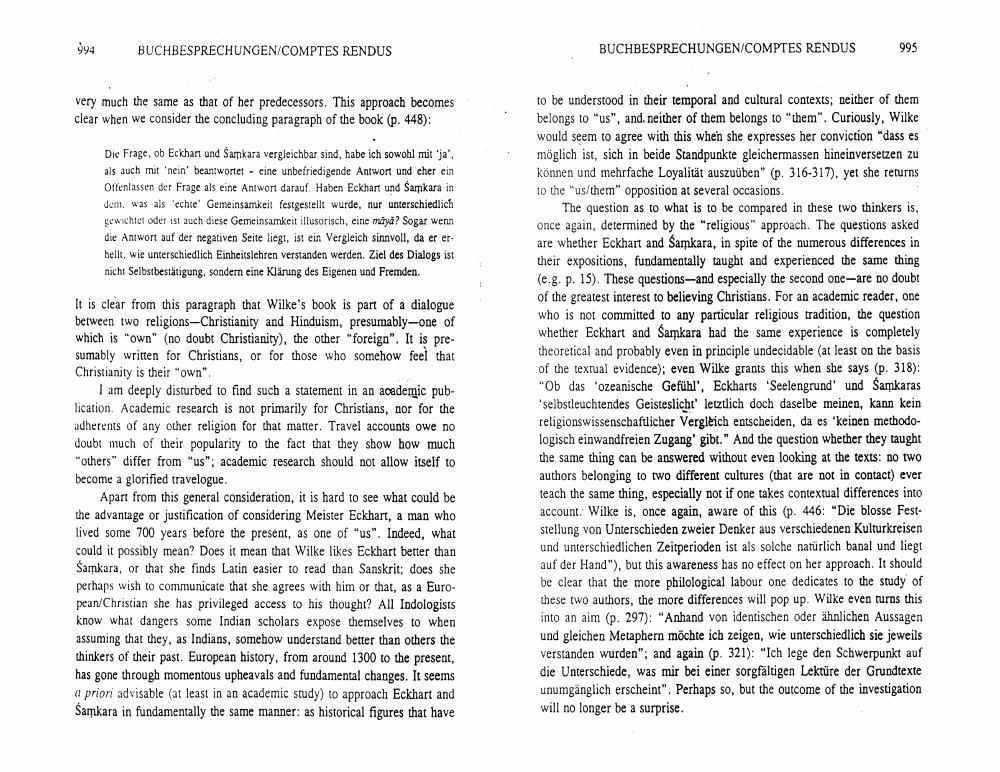Book Title: Buchbesprechungen Comptes Rendues Author(s): Rudolf Pfister Publisher: Rudolf Pfister View full book textPage 3
________________ 994 BUCHBESPRECHUNGEN/COMPTES RENDUS BUCHBESPRECHUNGEN/COMPTES RENDUS 995 very much the same as that of her predecessors. This approach becomes clear when we consider the concluding paragraph of the book (p. 448): Die Frage, ob Eckhart und Sankara vergleichbar sind, habe ich sowohl mit 'ja', als auch mit "nein beantwortet - cine unbefriedigende Antwort und eher ein Offenlassen der Frage als eine Antwort darauf Haben Eckhart und Samkara in dem, was als 'echte' Gemeinsamkeit festgestellt wurde, nur unterschiedlich gewichtet oder ist auch diese Gemeinsamkeit illusorisch, eine miya? Sogar wenn die Antwort auf der negativen Seite liegt, ist ein Vergleich sinnvoll, da er erhellt, wie unterschiedlich Einheitslehren verstanden werden. Ziel des Dialogs ist nicht Selbstbestätigung, sondern eine Klärung des Eigenen und Fremden It is clear from this paragraph that Wilke's book is part of a dialogue between two religions-Christianity and Hinduism, presumably-one of which is "own" (no doubt Christianity), the other foreign". It is presumably written for Christians, or for those who somehow feel that Christianity is their "own". I am deeply disturbed to find such a statement in an academic publication Academic research is not primarily for Christians, nor for the adherents of any other religion for that matter. Travel accounts owe no doubt much of their popularity to the fact that they show how much "others" differ from "us"; academic research should not allow itself to become a glorified travelogue. Apart from this general consideration, it is hard to see what could be the advantage or justification of considering Meister Eckhart, a man who lived some 700 years before the present, as one of "us". Indeed, what could it possibly mean? Does it mean that Wilke likes Eckhart better than Samkara, or that she finds Latin easier to read than Sanskrit: does she perhaps wish to communicate that she agrees with him or that, as a European/Christian she has privileged access to his thought? All Indologists know what dangers some Indian scholars expose themselves to when assuming that they, as Indians, somehow understand better than others the thinkers of their past. European history, from around 1300 to the present, has gone through momentous upheavals and fundamental changes. It seems a priori advisable (at least in an academic study) to approach Eckhart and Samkara in fundamentally the same manner: as historical figures that have to be understood in their temporal and cultural contexts, neither of them belongs to "us", and neither of them belongs to "them". Curiously, Wilke would seem to agree with this when she expresses her conviction "dass es möglich ist, sich in beide Standpunkte gleichermassen hineinversetzen zu können und mehrfache Loyalität auszuüben" (p. 316-317). yet she returns to the "us/them" opposition at several occasions The question as to what is to be compared in these two thinkers is. once again, determined by the "religious" approach. The questions asked are whether Eckhart and Samkara, in spite of the numerous differences in their expositions, fundamentally taught and experienced the same thing (e.g. p. 15). These questions-and especially the second one-are no doubt of the greatest interest to believing Christians. For an academic reader, one who is not committed to any particular religious tradition, the question whether Eckhart and Samkara had the same experience is completely theoretical and probably even in principle undecidable (at least on the basis of the textual evidence); even Wilke grants this when she says (p. 318): "Ob das 'ozeanische Gefühl', Eckharts Seelengrund' und Samkaras selbstleuchtendes Geisteslicht' letztlich doch daselbe meinen, kann kein religionswissenschaftlicher Vergleich entscheiden, da es keinen methodologisch einwandfreien Zugang' gibt." And the question whether they taught the same thing can be answered without even looking at the texts: no two authors belonging to two different cultures that are not in contact) ever teach the same thing, especially not if one takes contextual differences into account. Wilke is, once again, aware of this (p. 446: "Die blosse Feststellung von Unterschieden zweier Denker aus verschiedenen Kulturkreisen und unterschiedlichen Zeitperioden ist als solche natürlich banal und liegt auf der Hand"), but this awareness has no effect on her approach. It should be clear that the more philological labour one dedicates to the study of these two authors, the more differences will pop up. Wilke even turns this into an aim (p. 297): "Anhand von identischen oder ähnlichen Aussagen und gleichen Metaphern möchte ich zeigen, wie unterschiedlich sie jeweils verstanden wurden"; and again (p. 321): "Ich lege den Schwerpunkt auf die Unterschiede, was mir bei einer sorgfältigen Lektüre der Grundtexte unumgänglich erscheint". Perhaps so, but the outcome of the investigation will no longer be a surprise.Page Navigation
1 2 3 4
